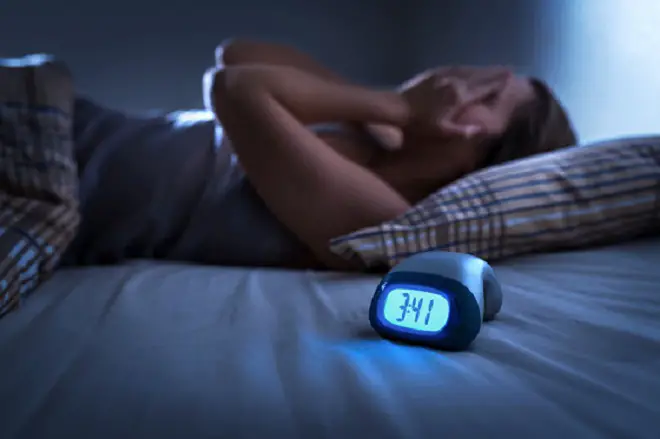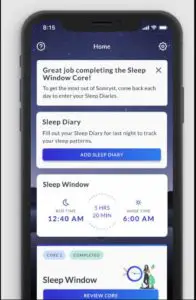Unable to sleep and looking for the Best Online CBT-I program or app?
You’ve come to the right place!
Insomnia is an extremely common sleep disorder that occasionally affects around 35% of people, while up to 10% of people have chronic insomnia.
Although melatonin and other sleeping pills are effective to quite an extent for some insomniacs, constant usage can lead to addiction and several dangerous side effects.
CBT-I or cognitive behavioral therapy for insomnia is a non-drug option that’s highly effective in treating insomnia. For more than 10 years, online CBT has been successful in helping patients manage and cope with different mental health challenges.
However, despite its popularity, there is a lack of providers.
In response to this shortage, several companies have developed online CBT-I programs and apps.
Let’s take a look at some of the best ones available today!
Who might Benefit from CBT-I Therapy?
Any individual with sleep problems can benefit from cognitive behavioral therapy for insomnia. Along with helping people who have primary insomnia, CBT-I allows people with chronic pain or mental health disorders, such as anxiety and depression.
The positive effects of this type of therapy seem to last, and there’s no evidence that it can cause any negative side effects.
CBT-I needs steady practice. Although some approaches might result in you losing sleep initially, it’s essential to stick with the program to ensure lasting results.
CBT-I is also a good treatment option for those worried about becoming dependent on sleeping pills and those who use medications that aren’t effective or have negative side effects.
Unlike sleeping pills, cognitive behavioral therapy focuses on the underlying cause of insomnia instead of just treating the symptoms.
However, it takes a lot of time and effort to train your body to sleep. In some cases, a mix of CBT-I and sleep medication might be the best treatment.
What’s In This Buying Guide
This guide thoroughly explains how CBT-I works, reviews some of the best online CBT-I apps and programs available today, and discusses the advantages and disadvantages of online CBT-I.
It also outlines the features you should look for before joining an app or program, so you don’t end up wasting your time and money.
Best Online CBT-I programs and apps
| Product | FDA-approved | Peer-reviewed | Number of sessions | Duration | Customizable |
|---|---|---|---|---|---|
Somryst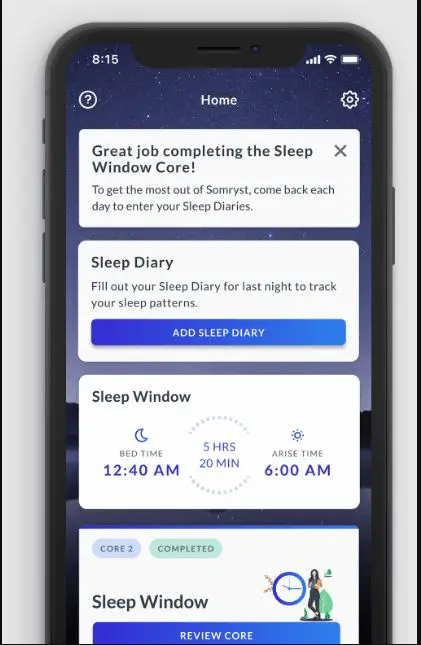 | Yes | Yes | 6 | 6-9 weeks | Yes |
Sleepio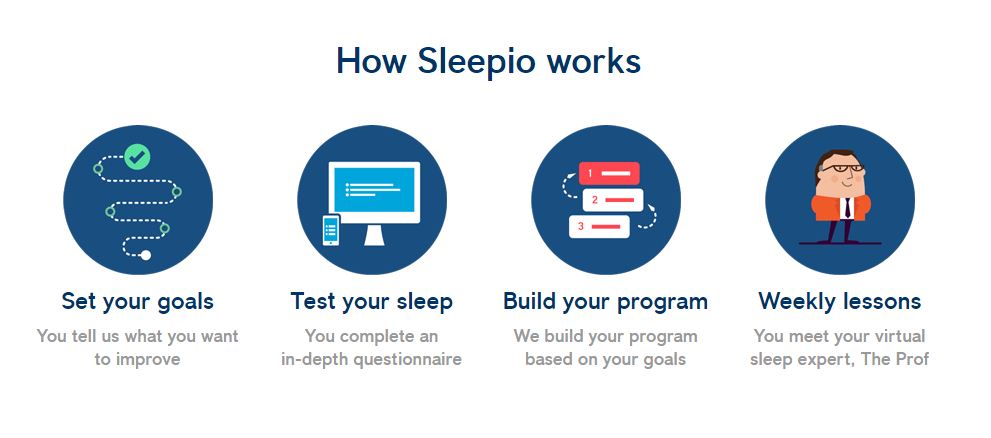 | No | Yes | 6 | 6 weeks | No |
RESTORE by Cobalt Therapeutics  | No | Yes | 7 | 5 weeks | No |
CBT-I Coach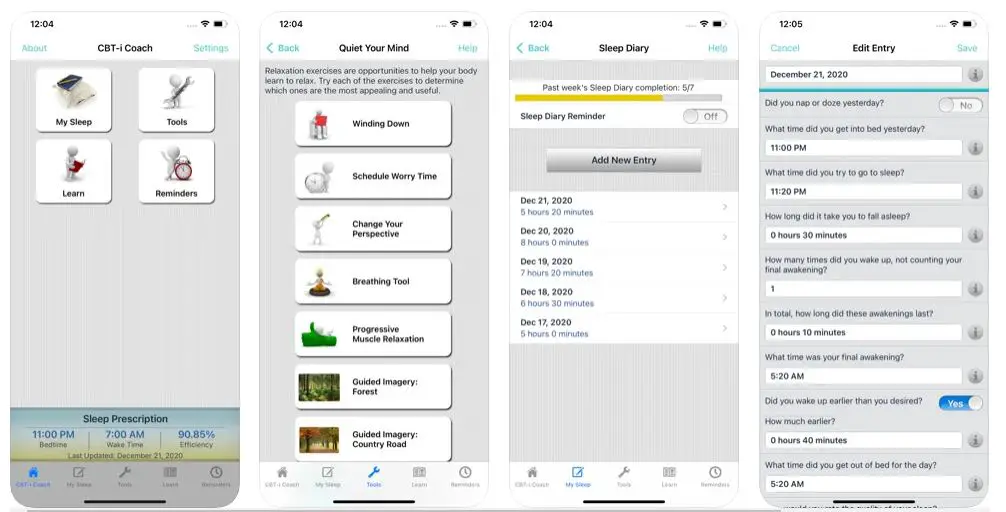 | No | Yes | - | - | Yes |
Conquering Insomnia Program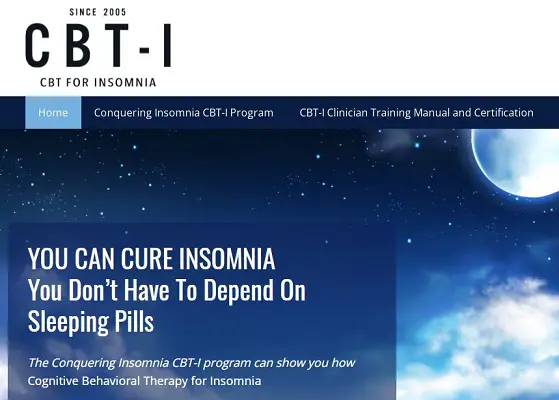 | No | No | 5 | 5 weeks | No |
1. Somryst
Somryst was first tested under the name of SHUTi (Sleep Healthy Using the Internet), which is an early version of the app with the same content.
Somryst is incredibly effective, and the app showed persistent results in patients at six- and twelve-month follow-ups in clinical trials.
Delivering CBT-I through an app-based platform, Somryst gives you full access to FDA-approved treatment.
Using the app is like hiring a personal trainer to help you build and develop your sleep muscles. It consists of six lessons or exercises that you can complete at your own pace (you can take up to nine weeks) and helps you fall asleep faster and stay asleep for a longer time.
The app also teaches you about cognitive behavioral therapy and explains why it’s an effective treatment for chronic insomnia.
It also allows you to set goals and provides printable reference materials, homework, interactive quizzes, and Fitbit integration for a more customized experience.
Even better, you won’t have to do any guesswork. The program tells you exactly what to do and the right time to do it and offers constant progress tracking and feedback as you complete your sessions. It also gives you the option of sharing your progress with your therapist, so they can update your records.
The clinician dashboard is incredibly intuitive as well. It displays information about the patients’ progress, including the Patient Health Questionnaire 8 scores, the Insomnia Severity Index, and sleep metrics determined from their nightly sleep diaries.
According to Pear’s website, Somryst has received FDA clearance as well, but like the company’s other treatment, it’s only available by prescription.
In a clinical trial, the app helped 45% of patients fall asleep faster, 52% stay asleep longer, and 45% experience less intense insomnia symptoms.
2. Sleepio
Founded by Dr. Bryony Sheaves and Colin Espie, Ph.D., Sleepio is based on almost 30 years of research and clinical experience.
After joining the program, you’ll need to complete a short sleep questionnaire, which will primarily include questions about your lifestyle and sleep problems. The app will then offer you a tailored program and an animated cartoon therapist called “The Prof.”
The program consists of weekly 20-minute sessions with The Prof for six weeks. In between sessions, you’ll have to complete your sleep diaries and practice your techniques.
Sleepio also allows you to join an online user community and offers educational materials, progress reports, relaxation MP3s, email reminders, and other convenient features.
The app claims that patients experience 62% fewer awakenings during the night, a 58% increase in focus and daytime functioning, and a 54% decrease in sleep onset. You can even review the evidence behind these claims yourself, as they’re all available on Sleepio’s website.
A 2012 study following 164 adults using Sleepio to treat their insomnia was also published in the Journal SLEEP. Participants experienced a 20% boost in their sleep efficiency, and the improvements persisted at follow-up.
3. Restore by Cobalt Therapeutics
RESTORE was launched in 2006 and is available in both Spanish and English.
Designed by Dr. Norah Vincent, the app received international attention when the results from its controlled, randomized trial were published in SLEEP in 2009. Time Magazine, AOL Health, MSN, US News, and The New York Times also reported on the results.
RESTORE offers seven sessions that you need to complete in five weeks. The program provides downloadable educational materials pertaining to sleep exercises and hygiene to help patients get better and more restful sleep.
Cobalt Therapeutics states that 80% of individuals who complete the program experience a significant reduction in the intensity of their symptoms.
The 2009 study included 118 adults suffering from chronic insomnia. Once the participants completed their five-week RESTORE program, 81% reported a mild improvement in insomnia symptoms, with more than a third stating that their symptoms had “much or very much improved.”
More than 30% of the participants who completed the program could sleep a full hour more and had less anxious thoughts around bedtime. However, the dropout rate was 11% more than that of traditional therapy.
Since the 2009 study, Dr. Norah Vincent, Ph.D., has conducted ten more studies, all of which have achieved similar results.
At least 80% of participants reported improvements in total sleep time, daytime productivity, sleep-onset, and wake after sleep onset.
4. CBT-I Coach
CBT-I Coach was developed as a digital tool to help patients in physical CBT-I therapy. The Veterans Affairs National Center for PTSD launched the app in 2013 to allow soldiers suffering from chronic insomnia.
Its features include educational resources about CBT-I and how it works, tips to help improve sleep environments and develop healthy sleep routines, a sleep diary to record sleep and wake-up times, and relaxation exercises to help patients go back to sleep.
The app is available for free on both iOS and Android. Although you should use CBT-I Coach with in-person therapy with a healthcare provider, you can also use it as a self-help mobile app for developing good sleep habits.
However, make sure you don’t use the app as a replacement for therapy.
The US Department of VA also surveyed VA CBT-I trained clinicians about their perception of the app. Most clinicians had a favorable impression, with 60% reporting that they used it with their patients to improve their adherence to homework.
5. Conquering Insomnia Program
Launched by Dr. Gregg Jacobs, Ph.D., the Conquering Insomnia Program has been around for a very long time. The PDF-based treatment consists of weekly sessions over a span of five weeks.
Along with the program, the website also includes a blog that keeps track of the latest news in the cognitive behavioral therapy world.
The program is based on Dr. Jacob’s 2004 research on the effectiveness and efficacy of CBT-I. The study observed 63 young and middle-aged individuals suffering from chronic sleep-onset insomnia.
The participants reported an 80% decrease in their dependence on sleeping pills, a 70% increase in sleep time, an 85% improvement in the quality of sleep, and fewer nights of insomnia.
There are currently no studies about the effectiveness of this particular program, but the website does list a few testimonials.
CBT-I Buying Guide
What is Cognitive Behavioral Therapy for Insomnia?
Cognitive Behavioral Therapy or CBT is a type of psycho-social treatment that focuses on improving mental health. It aims to boost emotional regulation and develop coping strategies that help manage and solve the patient’s current problem.
In most cases, a healthcare professional or therapist helps change your perception of a specific situation from a negative viewpoint to a positive one, encouraging positive thoughts.
CBT-I basically centers around the idea that we develop habits when our brain frequently reacts to certain positive or negative stimuli.
This means that if you perceive particular situations in a more positive and up-building manner, you’ll create a healthier pattern, which will then turn into a habit over time.
A therapist or CBT-I specialist will help you understand the cause of your insomnia, determining whether it’s a psychological issue or something else.
The healthcare professional will also help you develop healthier sleeping schedules and habits to either relieve the symptoms or eliminate them entirely.
For instance, a person might develop insomnia if they believe they need eight hours of sleep. If they don’t get the required eight hours, they’ll feel shame, concern, and guilt, even if they’re sufficiently refreshed after seven hours of sleep.
These negative emotions can consequently make it difficult for them to relax and fall asleep, resulting in insomnia.
A CBT-I specialist will help this patient uncover the reason behind their belief in the “correct” amount of sleep and teach them how to overcome it and develop a healthy sleep cycle.
Online CBT-I programs and apps work in the same way.
Although you won’t be talking to a live therapist, the app will track and record your sleep pattern, present you with questionnaires to help identify the underlying cause, and give you relaxing exercises that help ensure better sleep.
CBT for Insomnia: How it works
CBT-I is one of the most lasting and effective treatments for insomnia. The disorder is closely linked with anxiety, stress, depression, and several different mental and emotional health conditions.
As mentioned above, CBT-I directly addresses the symptoms of the associated health issues, making it more effective than sleep medication.
The main aim of CBT-I is to help patients develop better sleep habits. In-person therapy usually consists of four to twelve sessions with a nurse practitioner, psychologist, or healthcare professional specializing in CBT.
CBT-I specialists question patients about their behaviors and thoughts about their sleep, like how many hours they sleep and what type of anxieties they have.
Even after the session, this work continues as patients are given homework and instructed to maintain a detailed sleep diary.
Some of the most popular CBT-I techniques include:
Stimulus Control
Many people don’t realize how certain stimuli can negatively affect their ability to fall asleep, such as light, temperature, and noise.
This technique teaches patients focused sleep hygiene exercises, such as using the bedroom for sleep only, keeping the bedroom quiet, cool, and dark, removing all things associated with other work or leisure activities, and not eating, drinking, or exercising before bed.
Sleep Restriction
This practice involves adhering to a strict sleep schedule and adopting bedtime and wake-up times assigned by a therapist.
Patients will have to follow their therapist’s instructions to the letter, even if they don’t get enough sleep. This technique aims to associate the bedroom with sleep and train the mind to follow a new sleep schedule.
Relaxation Training
Some people suffer from stress and anxiety disorders. CBT-I specialists can help teach them muscle relaxation techniques, meditation, visualization, and deep breathing exercises, so they’re able to relax before going to sleep.
Biofeedback
This technique involves patients using a biofeedback device to monitor muscle tension or heart rate rises and determines whether they relate to their feelings about sleep. This can then help patients adjust their bodily reactions accordingly.
Paradoxical Intention
In this method, patients stay in bed, follow good sleep hygiene, and try to stay passively awake. Since worrying about being unable to fall asleep alleviates your anxiety and keeps you awake, making no active effort to sleep can help you let go of this worry and might paradoxically help you relax and fall asleep.
What to Look for in Online CBT-I Programs/Apps
In this post-pandemic world, it’s crucial that you find the right online CBT-I program or app. To help you make the right decision, we’ve outlined some key features you should look for before making a purchase:
Customization
It’s better to choose a customizable CBT-I program or app so that the treatment can be designed according to the patient’s needs and habits.
Multilingual
It’s advisable to opt for an app that delivers content in several different languages. This can make it easier for you to understand the sessions and treatments if English is not your first language.
Personalized Accounts
Make sure the program or app you choose provides you with a personalized username. You should also go through the app’s confidentiality agreement to check whether it protects your privacy.
Intuitive Interface
It’s better to opt for an online CBT-I app or program that’s easy to understand and use. The program should automatically proceed to the next level once you complete the given assignments and tasks. It should also offer live online workshops for streaming and multimedia files for download.
Therapist Guidance and Support
This feature includes check-ins in the form of weekly texts or emails, so the therapist can answer any individual questions, provide motivation, give guidance and advice on the completion of assignments and tasks, and ensure follow-up.
Make sure the app you choose gives you frequent questionnaires, surveys, and homework assignments as well, so it can keep track of your progress.
Pros and Cons of Online CBT-I
Although online CBT-I has proven to be an effective treatment, it has a few disadvantages as well. To help you decide whether you should opt for online CBT-I, we’ve listed its pros and cons. Make sure you go through both before making a decision.
Pros
- Online CBT-I is easily accessible to anyone with a secure internet connection. It allows you to attend your therapy sessions on your own schedule and terms and gets rid of the hassle of scheduling an appointment with a healthcare professional.
- Several studies have proven that online CBT-I is just as effective as in-person CBT-I.
- Online CBT-I can be less costly than traditional CBT-I, but this depends on the patient’s health insurance coverage.
Cons
- Although self-motivated individuals might be able to follow an online therapy program easily, the majority of people actually benefit from the accountability aspect of in-person therapy. By simply knowing that someone is expecting you to keep a detailed sleep diary and complete your homework, you’ll be able to keep yourself motivated.
- Keeping in mind the point mentioned above, online CBT-I apps and programs usually have a higher dropout rate, so it’s less likely that you’ll complete your treatment and experience insomnia relief.
- Online CBT-I is not suitable for insomnia patients because of an underlying condition or a sleep disorder. Although a trained healthcare provider will be able to identify the signs, this is not possible with online therapy.
Frequently Asked Questions
What is the average time for CBT-I to take effect?
Traditional cognitive behavioral therapy includes weekly 30- to 60-minute sessions over a span of 12 to 20 weeks. However, intensive CBT-I is a newer and faster option and includes longer sessions fitted into a weekend, week, or month. It sometimes employs a single 8-hour session as well.
Is CBT-I an effective treatment?
There’s a lot of evidence that proves CBT-I is an incredibly effective treatment. A 2015 analysis of 20 CBT-I studies found that insomniacs who adopted CBT-I stayed awake for 30 fewer minutes and fell asleep 20 minutes faster than individuals who didn’t.
CBT-I is a uniquely effective and highly practical treatment because, unlike sleep medications and other remedies, it directly addresses the heart of the issue, which is the problematic behaviors and attitudes that an individual has around sleep.
In 2017, studies were also conducted to determine the effectiveness of online CBT-I. In a study of approximately 150 individuals with mild insomnia, people using an automated CBT-I mobile app experienced considerable improvement in both their sleep efficiency and the severity of their insomnia.
Multiple studies have further proven the effectiveness of online CBT-I, and even the AASM (American Academy of Sleep Medicine) has endorsed it as an effective treatment for insomnia.
What should I do if CBT-I doesn’t work?
If CBT-I doesn’t work, you should work with your doctor and then decide whether your treatment should include drug therapy or not.
Final Verdict: What is the Best Online CBT-I Program?
With such an important issue, choosing the best online CBT-I program is next to impossible.
Every person’s brain is wired differently, so you’ll have to see which program will improve your progress yourself.
However, it’s advisable to opt for an app or program that’s peer-reviewed or has scientific data and studies backing it up.
Affiliate Disclosure
Affiliate Disclosure: I may earn a small commission (at no cost to you) if you purchase a mattress after clicking a referral link or using a coupon code on this site. That said, all content and opinions on this site are my own and are NOT affected by these payments.
This site participates in the Amazon Services LLC Associates Program, an affiliate advertising program designed to provide a means for sites to earn advertising fees by advertising and linking to Amazon.com.
*Amazon and the Amazon logo are trademarks of Amazon.com, Inc, or its affiliates.

